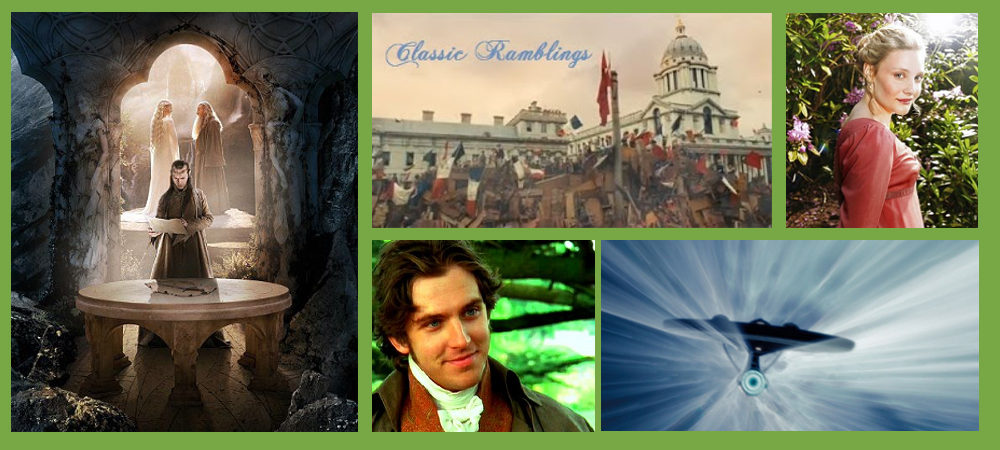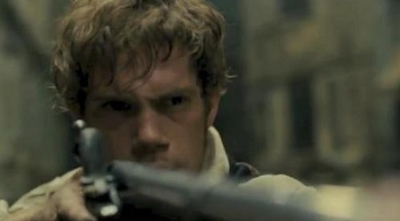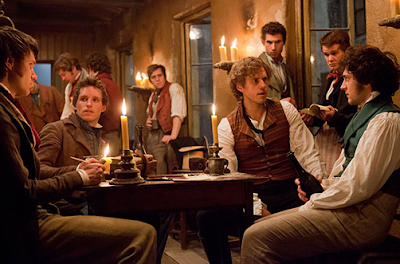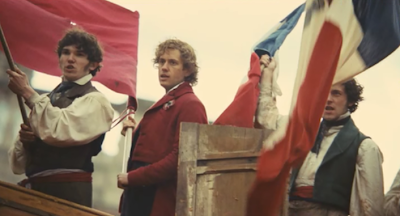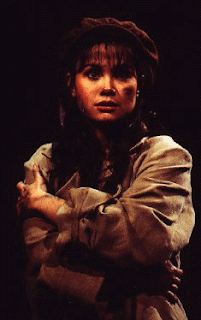While doing the tag for CMW earlier this week, I had to answer a question about my three favorite characters. I answered Jean Valjean, Fantine and Eponine 'cause it was too hard to narrow it down otherwise. However, I'm making up for it now with an in-depth post about the barricade boys! More specifically, my top five favorites.
1. Combeferre
"Combeferre was
as gentle as Enjolras was severe, through natural whiteness.
He loved the word citizen, but he preferred the word man. He would
gladly have said: Hombre, like the Spanish. He read everything,
went to the theatres, attended the courses of public lecturers,
learned the polarization of light from Arago, grew enthusiastic
over a lesson in which Geoffrey Sainte-Hilaire explained the
double function of the external carotid artery, and the internal,
the one which makes the face, and the one which makes the brain;
he kept up with what was going on, followed science step by step,
compared Saint-Simon with Fourier, deciphered hieroglyphics,
broke the pebble which he found and reasoned on geology,
drew from memory a silkworm moth, pointed out the faulty French
in the Dictionary of the Academy, studied Puysegur and Deleuze,
affirmed nothing, not even miracles; denied nothing, not even ghosts;
turned over the files of the Moniteur, reflected. He declared
that the future lies in the hand of the schoolmaster, and busied
himself with educational questions. He desired that society
should labor without relaxation at the elevation of the moral
and intellectual level, at coining science, at putting ideas
into circulation, at increasing the mind in youthful persons,
and he feared lest the present poverty of method, the paltriness
from a literary point of view confined to two or three centuries
called classic, the tyrannical dogmatism of official pedants,
scholastic prejudices and routines should end by converting our
colleges into artificial oyster beds. He was learned, a purist,
exact, a graduate of the Polytechnic, a close student, and at the
same time, thoughtful "even to chimaeras," so his friends said.
He believed in all dreams, railroads, the suppression of suffering
in chirurgical operations, the fixing of images in the dark chamber,
the electric telegraph, the steering of balloons. Moreover, he was
not much alarmed by the citadels erected against the human mind
in every direction, by superstition, despotism, and prejudice.
He was one of those who think that science will eventually turn
the position."
-Chapter I, "The Friends of the A B C," Marius, Les Miserables
Combeferre is my favorite barricade boy, ever. He's calm and logical, and has his own kind of cool strength. He loves peace and "prefers the whiteness of beauty to the radiance of the sublime." He's also very compassionate, and hates to see anyone get hurt. He is willing to consider anything, he's very studious, and he's Enjolras' best friend.
At the barricades, he's usually doing something that will comfort someone. He supports Enjolras when he murders Le Cabuc (brick only), he is the first to suggest that the insurgents negotiate with the National Guard for the life of Jehan. In the movie, he's one of the last ones standing; he dies with Joly and Courfeyrac, trying to protect them. In the brick, he's helping a wounded soldier, one of the enemy, to safety. His reward? Getting bayoneted in the back.
2. Jehan Prouvaire
"Jean Prouvaire was a still softer shade than Combeferre. His name
was Jehan, owing to that petty momentary freak which mingled
with the powerful and profound movement whence sprang the very
essential study of the Middle Ages. Jean Prouvaire was in love;
he cultivated a pot of flowers, played on the flute, made verses,
loved the people, pitied woman, wept over the child, confounded God
and the future in the same confidence, and blamed the Revolution
for having caused the fall of a royal head, that of Andre Chenier.
His voice was ordinarily delicate, but suddenly grew manly.
He was learned even to erudition, and almost an Orientalist.
Above all, he was good; and, a very simple thing to those who know
how nearly goodness borders on grandeur, in the matter of poetry,
he preferred the immense. He knew Italian, Latin, Greek, and Hebrew;
and these served him only for the perusal of four poets:
Dante, Juvenal, AEschylus, and Isaiah. In French, he preferred
Corneille to Racine, and Agrippa d'Aubigne to Corneille.
He loved to saunter through fields of wild oats and corn-flowers,
and busied himself with clouds nearly as much as with events.
His mind had two attitudes, one on the side towards man, the other
on that towards God; he studied or he contemplated. All day long,
he buried himself in social questions, salary, capital, credit,
marriage, religion, liberty of thought, education, penal servitude,
poverty, association, property, production and sharing, the enigma
of this lower world which covers the human ant-hill with darkness;
and at night, he gazed upon the planets, those enormous beings.
Like Enjolras, he was wealthy and an only son. He spoke softly,
bowed his head, lowered his eyes, smiled with embarrassment,
dressed badly, had an awkward air, blushed at a mere nothing,
and was very timid. Yet he was intrepid."
-Chapter I, "The Friends of the A B C," Marius, Les Miserables
Jehan is so sweet. He loves flowers, writes poetry, has a sweetheart, and is adorably awkward. But he's also brave and honorable, and ready to stand up for what's right. He's also the only barricade boy who's said to be a Christian.
At the barricades, he's taken prisoner by the National Guard. Enjolras and Combeferre are about to try to trade his life for that of Javert, but they're too late. Before he dies, Jehan shouts, "Long live France! Long live the future!" He's making one last stand against what he thinks is wrong.
3. Enjolras

"Enjolras was a charming young man, who was capable of being terrible.
He was angelically handsome. He was a savage Antinous. One would
have said, to see the pensive thoughtfulness of his glance, that he
had already, in some previous state of existence, traversed the
revolutionary apocalypse. He possessed the tradition of it as though
he had been a witness. He was acquainted with all the minute details
of the great affair. A pontifical and warlike nature, a singular
thing in a youth. He was an officiating priest and a man of war;
from the immediate point of view, a soldier of the democracy;
above the contemporary movement, the priest of the ideal. His eyes
were deep, his lids a little red, his lower lip was thick and easily
became disdainful, his brow was lofty. A great deal of brow in a face
is like a great deal of horizon in a view. Like certain young men
at the beginning of this century and the end of the last, who became
illustrious at an early age, he was endowed with excessive youth,
and was as rosy as a young girl, although subject to hours of pallor.
Already a man, he still seemed a child. His two and twenty years
appeared to be but seventeen; he was serious, it did not seem
as though he were aware there was on earth a thing called woman.
He had but one passion--the right; but one thought--to overthrow
the obstacle. On Mount Aventine, he would have been Gracchus;
in the Convention, he would have been Saint-Just. He hardly saw
the roses, he ignored spring, he did not hear the carolling
of the birds; the bare throat of Evadne would have moved him no
more than it would have moved Aristogeiton; he, like Harmodius,
thought flowers good for nothing except to conceal the sword.
He was severe in his enjoyments. He chastely dropped his eyes
before everything which was not the Republic. He was the marble
lover of liberty. His speech was harshly inspired, and had the
thrill of a hymn. He was subject to unexpected outbursts of soul."
-Chapter I, "The Friends of the A B C," Marius, Les Miserables
Enjolras is my third-favorite barricade boy. He has his faults, it's true- he's too narrow-minded and dogmatic, and he can be pretty ruthless. But he's also incredibly strong and mature, and he doesn't turn bitter or angry even though he has no one to support him and he loves no one but France.
At the barricades, Enjolras dies facing an entire army without flinching. They respect him, even though he's their enemy. He is ready to comfort Grantaire when they're about to die. And he doesn't try to escape or plead for his life.
I've actually written a post about Enjolras- if you want to hear my full opinion on him, you can read it here.
4. Courfeyrac
"Courfeyrac had, in fact, that animation of youth which may be called the beaute du diable of the mind. Later on, this disappears like the playfulness of the kitten, and all this grace ends, with the bourgeois, on two legs, and with the tomcat, on four paws.
This sort of wit is transmitted from generation to generation of the successive levies of youth who traverse the schools, who pass it from hand to hand, quasi cursores, and is almost always exactly the same; so that, as we have just pointed out, any one who had listened to Courfeyrac in 1828 would have thought he heard Tholomyes in 1817. Only, Courfeyrac was an honorable fellow. Beneath the apparent similarities of the exterior mind, the difference between him and Tholomyes was very great. The latent man which existed in the two was totally different in the first from what it was in the second. There was in Tholomyes a district attorney, and in Courfeyrac a paladin.
Enjolras was the chief, Combeferre was the guide, Courfeyrac was the centre. The others gave more light, he shed more warmth; the truth is, that he possessed all the qualities of a centre, roundness and radiance."
-Chapter I, "The Friends of the A B C," Marius, Les Miserables
Courfeyrac is cheerful and fun. He's witty, and he likes to laugh. He's optimistic and rarely takes things seriously. However, he is courageous and honorable (a "paladin" is "a knight renowned for heroism and chivalry," after all), and he never hesitates to do good for someone.
Victor Hugo gives no particulars about Courfeyrac's death; only "Courfeyrac was killed." But in the movie, he dies with Enjolras, Joly and Combeferre. He stayed strong in his own way, making fun of the soldiers and cracking jokes until he fell.
5. Grantaire
"Among all these glowing hearts and thoroughly convinced minds,
there was one sceptic. How came he there? By juxtaposition.
This sceptic's name was Grantaire, and he was in the habit of
signing himself with this rebus: R. Grantaire was a man who took
good care not to believe in anything. Moreover, he was one of the
students who had learned the most during their course at Paris;
he knew that the best coffee was to be had at the Cafe Lemblin,
and the best billiards at the Cafe Voltaire, that good cakes and
lasses were to be found at the Ermitage, on the Boulevard du Maine,
spatchcocked chickens at Mother Sauget's, excellent matelotes
at the Barriere de la Cunette, and a certain thin white wine at
the Barriere du Com pat. He knew the best place for everything;
in addition, boxing and foot-fencing and some dances; and he was a
thorough single-stick player. He was a tremendous drinker to boot.
He was inordinately homely: the prettiest boot-stitcher of that day,
Irma Boissy, enraged with his homeliness, pronounced sentence on him
as follows: "Grantaire is impossible"; but Grantaire's fatuity was
not to be disconcerted. He stared tenderly and fixedly at all women,
with the air of saying to them all: "If I only chose!" and of trying
to make his comrades believe that he was in general demand."
-Chapter I, "The Friends of the A B C," Marius, Les Miserables
Grantaire is lazy, a drunkard, and cynical. He's only tolerated by the other Friends of the ABC because he's also cheerful and friendly. The only thing he believes in is Enjolras, and he keeps his faith in him even though he's continually yelled at or disdained. (I think Enjolras was way too harsh with him, but that's no the point here.)
At the barricades, Grantaire gets drunk and sleeps through the entire battle; he wakes up just as Enjolras is about to get shot. He could have stayed where he was; the soldiers would probably have missed him, and he could have escaped. Instead, he stood up and proclaimed that he was one of them, redeeming himself for all his past mistakes. He was shot with Enjolras.
And those are my favorite barricade boys!
Note: I consider the term "Friends of the ABC" to include only the nine young men Victor Hugo listed. Therefore, Eponine, Gavroche and Marius are not included in "The Friends of the ABC." However, they did fight at the barricade, so I consider them "insurgents," and to a lesser extent, "barricade boys." That's why Eponine, Gavroche and Marius are not on this list.
Who are your favorite barricade boys? Why?
-Chapter I, "The Friends of the A B C," Marius, Les Miserables
Enjolras is my third-favorite barricade boy. He has his faults, it's true- he's too narrow-minded and dogmatic, and he can be pretty ruthless. But he's also incredibly strong and mature, and he doesn't turn bitter or angry even though he has no one to support him and he loves no one but France.
At the barricades, Enjolras dies facing an entire army without flinching. They respect him, even though he's their enemy. He is ready to comfort Grantaire when they're about to die. And he doesn't try to escape or plead for his life.
I've actually written a post about Enjolras- if you want to hear my full opinion on him, you can read it here.
4. Courfeyrac
"Courfeyrac had, in fact, that animation of youth which may be called the beaute du diable of the mind. Later on, this disappears like the playfulness of the kitten, and all this grace ends, with the bourgeois, on two legs, and with the tomcat, on four paws.
This sort of wit is transmitted from generation to generation of the successive levies of youth who traverse the schools, who pass it from hand to hand, quasi cursores, and is almost always exactly the same; so that, as we have just pointed out, any one who had listened to Courfeyrac in 1828 would have thought he heard Tholomyes in 1817. Only, Courfeyrac was an honorable fellow. Beneath the apparent similarities of the exterior mind, the difference between him and Tholomyes was very great. The latent man which existed in the two was totally different in the first from what it was in the second. There was in Tholomyes a district attorney, and in Courfeyrac a paladin.
Enjolras was the chief, Combeferre was the guide, Courfeyrac was the centre. The others gave more light, he shed more warmth; the truth is, that he possessed all the qualities of a centre, roundness and radiance."
-Chapter I, "The Friends of the A B C," Marius, Les Miserables
Courfeyrac is cheerful and fun. He's witty, and he likes to laugh. He's optimistic and rarely takes things seriously. However, he is courageous and honorable (a "paladin" is "a knight renowned for heroism and chivalry," after all), and he never hesitates to do good for someone.
Victor Hugo gives no particulars about Courfeyrac's death; only "Courfeyrac was killed." But in the movie, he dies with Enjolras, Joly and Combeferre. He stayed strong in his own way, making fun of the soldiers and cracking jokes until he fell.
5. Grantaire
-Chapter I, "The Friends of the A B C," Marius, Les Miserables
Grantaire is lazy, a drunkard, and cynical. He's only tolerated by the other Friends of the ABC because he's also cheerful and friendly. The only thing he believes in is Enjolras, and he keeps his faith in him even though he's continually yelled at or disdained. (I think Enjolras was way too harsh with him, but that's no the point here.)
At the barricades, Grantaire gets drunk and sleeps through the entire battle; he wakes up just as Enjolras is about to get shot. He could have stayed where he was; the soldiers would probably have missed him, and he could have escaped. Instead, he stood up and proclaimed that he was one of them, redeeming himself for all his past mistakes. He was shot with Enjolras.
And those are my favorite barricade boys!
Note: I consider the term "Friends of the ABC" to include only the nine young men Victor Hugo listed. Therefore, Eponine, Gavroche and Marius are not included in "The Friends of the ABC." However, they did fight at the barricade, so I consider them "insurgents," and to a lesser extent, "barricade boys." That's why Eponine, Gavroche and Marius are not on this list.
Who are your favorite barricade boys? Why?
